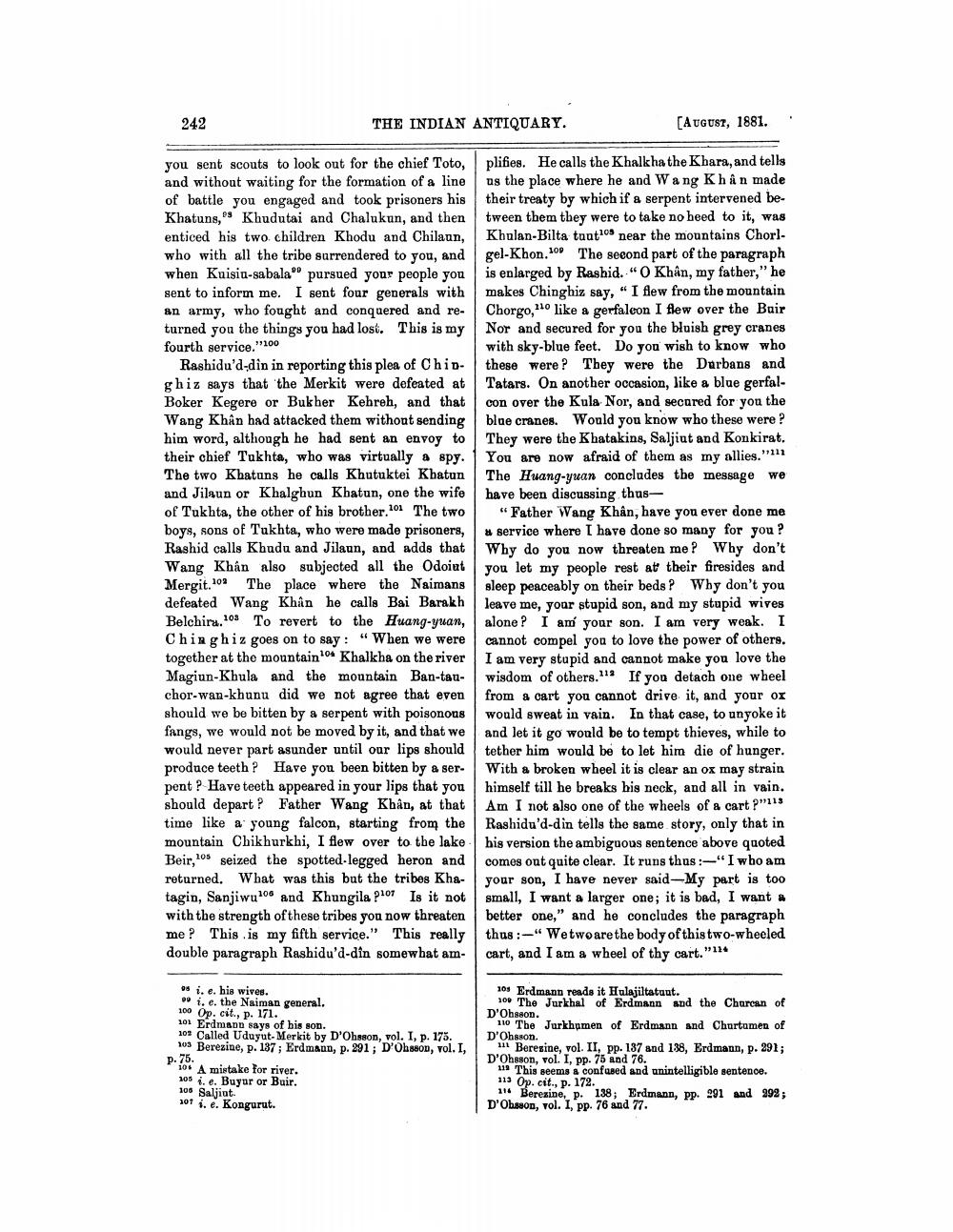________________
242
THE INDIAN ANTIQUARY.
[AUGUST, 1881.
.
you sent scouts to look out for the chief Toto, and without waiting for the formation of a line of battle you engaged and took prisoners his Khatuns, os Khudutai and Chalukun, and then enticed his two children Khodu and Chilaun, who with all the tribe surrendered to you, and when Kuisin-sabala" pursued your people you sent to inform me. I sent four generals with an army, who fought and conquered and returned you the things you had lost. This is my fourth service."100
Rashidu'd-dîn in reporting this plea of Chid- ghiz says that 'the Merkit were defeated at Boker Kegere or Bukher Kehreh, and that Wang Khan had attacked them without sending him word, although he had sent an envoy to their chief Takhta, who was virtually a spy. The two Khatons he calls Khutuktei Khatun and Jilsun or Khalghun Khatun, one the wife of Tukhta, the other of his brother.101 The two boys, sons of Tukhta, who were made prisoners, Rashid calls Khadu and Jilaun, and adds that Wang Khân also subjected all the Odoiut Mergit.102 The place where the Naimans defeated Wang Khân he calls Bai Barakh Belchira.103 To revert to the Huang-yuan, Chirghiz goes on to say: "When we were together at the mountain Khalkha on the river Magiun-Khula and the mountain Ban-tauchor-wan-khunu did we not agree that even should we be bitten by a serpent with poisonous fangs, we would not be moved by it, and that we would never part asunder until our lips should produce teeth? Have you been bitten by a ser. pent? Have teeth appeared in your lips that you should depart? Father Wang Khân, at that time like a young falcon, starting from the mountain Chikhurkhi, I flew over to the lake Beir, os seized the spotted-legged heron and returned. What was this but the tribes Kha- tagin, Sanjiwu106 and Khungila ?107 Is it not with the strength of these tribes you now threaten me? This is my fifth service." This really double paragraph Rashidu'd-dîn somewhat am
plifies. He calls the Khalkha the Khara, and tells us the place where he and Wang Khân made their treaty by which if a serpent intervened between them they were to take no beed to it, was Khulan-Bilta tants near the mountains Chorl. gel-Khon. The second part of the paragraph is enlarged by Rashid.." O Khân, my father," he makes Chinghiz say, "I few from the mountain Chorgo, to like a gerfalcon I flew over the Buir Nor and secured for you the bluish grey cranes with sky-blue feet. Do you wish to know who these were ? They were the Durbans and Tatars. On another occasion, like a blue gerfalcon over the Kula Nor, and secured for you the blue cranes. Would you know who these were ? They were the Khatakins, Saljiut and Konkirat. You are now afraid of them as my allies." The Huang-yuan concludes the message we have been discussing thus
"Father Wang Khân, have you ever done me # service where I have done so many for you? Why do you now threaten me? Why don't you let my people rest at their firesides and sleep peaceably on their beds? Why don't you leave me, your stupid son, and my stupid wives alone? I am your son. I am very weak. I cannot compel you to love the power of others. I am very stupid and cannot make you love the wisdom of others. 113 If you detach one wheel from a cart you cannot drive it, and your ox would sweat in vain. In that case, to unyoke it and let it go would be to tempt thieves, while to tether him would be to let him die of hunger. With a broken wheel it is clear an ox may strain himself till be breaks his neck, and all in vain. Am I not also one of the wheels of a cart?"l13 Rashidu'd-din tells the same story, only that in his version the ambiguous sentence above quoted comes out quite clear. It runs thus :-" I who am your son, I have never said-My part is too small, I want a larger one; it is bad, I want # better one," and he concludes the paragraph thus:-"Wetwo are the body of this two-wheeled cart, and I am a wheel of thy cart."!!*
05 i. e. his wives. - i.e. the Naiman general. 100 Op. cit., p. 171. 101 Erdmann says of his son. 10% Called Uduyut. Merkit by D'Ohsson, vol. I, p. 175. 103 Berezine, p. 137; Erdmann, p. 291 ; D'Ohsson, vol. I, 104 A mistake for river. 105 i. e. Buyur or Buir. 106 Saljiut. 101 1. e. Kongurut.
105 Erdmann reads it Hulajiltatuut.
10The Jurkhal of Erdmann and the Churcan of D'Obsson.
110 The Jurkhamen of Erdmann and Churtumen of D'Ohsson.
Berezine, vol. II, pp. 137 and 138, Erdmann, p. 291; D'Ohsson, vol. I, pp. 75 and 76.
119 This seems a confused and unintelligible sentence. 113 Op. cit., p. 172.
14 Berezine, p. 138; Erdmann, pp. 291 and 992; D'Obsson, vol. I, pp. 76 and 77.
p.75.




